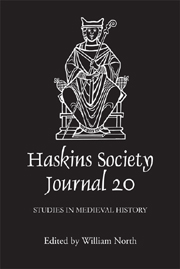Book contents
- Frontmatter
- Contents
- Editor's Note
- Abbreviations
- 1 Buckets, Monasteries, and Crannógs: Material Culture and the Rewriting of Early Medieval British History
- 2 Punishing Bodies and Saving Souls: Capital and Corporal Punishment in Late Anglo-Saxon England
- 3 Writing Latin History for a Lay Audience c. 1000: Dudo of Saint Quentin at the Norman Court
- 4 Between Neighbors and Saints: Waleran I of Meulan and the Allegiance of Lesser Lords in the Eleventh Century
- 5 Who Founded Durtal? Reconsidering the Evidence
- 6 Robert Curthose: Ineffectual Duke or Victim of Spin
- 7 The Chivalric Transformation and the Origins of Tournament as seen through Norman Chroniclers
- 8 An Internal Frontier? The Relationship between Mainland Southern Italy and Sicily in the ‘Norman’ Kingdom
- 9 ‘Hywel in the World’
- 10 Prices, Price Controls, and Market Forces in England under Edward I c. 1294–1307
4 - Between Neighbors and Saints: Waleran I of Meulan and the Allegiance of Lesser Lords in the Eleventh Century
Published online by Cambridge University Press: 12 September 2012
- Frontmatter
- Contents
- Editor's Note
- Abbreviations
- 1 Buckets, Monasteries, and Crannógs: Material Culture and the Rewriting of Early Medieval British History
- 2 Punishing Bodies and Saving Souls: Capital and Corporal Punishment in Late Anglo-Saxon England
- 3 Writing Latin History for a Lay Audience c. 1000: Dudo of Saint Quentin at the Norman Court
- 4 Between Neighbors and Saints: Waleran I of Meulan and the Allegiance of Lesser Lords in the Eleventh Century
- 5 Who Founded Durtal? Reconsidering the Evidence
- 6 Robert Curthose: Ineffectual Duke or Victim of Spin
- 7 The Chivalric Transformation and the Origins of Tournament as seen through Norman Chroniclers
- 8 An Internal Frontier? The Relationship between Mainland Southern Italy and Sicily in the ‘Norman’ Kingdom
- 9 ‘Hywel in the World’
- 10 Prices, Price Controls, and Market Forces in England under Edward I c. 1294–1307
Summary
Waleran I, the feisty eleventh-century lord of Meulan, raised his own profile considerably by shifting his support among his more powerful neighbors, especially the count of Blois-Chartres, the king, and the Norman duke. In this strategy, Waleran typifies his ilk. Yet much about him remains mysterious, particularly the reasons for which he assigned his loyalty to one party or another at given moments, and the reasons why he came to incline increasingly toward Normandy. Sources concerning Waleran are few and slender; he is generally overshadowed by his better known, late eleventh- and twelfth-century progeny, particularly his great-grandsons, the twins Robert II and Waleran II. Nevertheless, enough information is retrievable to illuminate some of the factors influencing his allegiance. Examining these factors sheds light not only on the doings of one little lord in the eleventh century, but also suggests the broader considerations according to which others like him acted as they maneuvered among, and influenced the affairs of, their larger neighbors.
After a brief overview of Waleran's long career, this examination will consider each of the factors that can be shown to have had some sway over his allegiance. Some factors that surely guided his choices will not be examined. Sheer self-aggrandizement, for example – which undoubtedly loomed large in Waleran's calculations – does not appear clearly in the sources about him. It must therefore be borne in mind as an element shaping his choices, even though its precise impact remains elusive.
- Type
- Chapter
- Information
- The Haskins Society Journal 202008 - Studies in Medieval History, pp. 78 - 93Publisher: Boydell & BrewerPrint publication year: 2009

